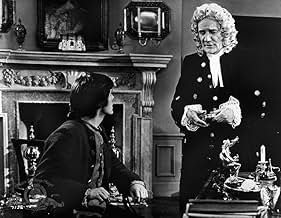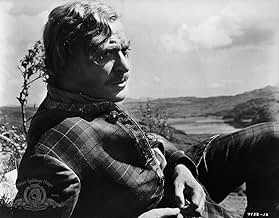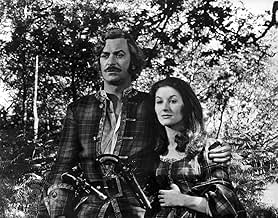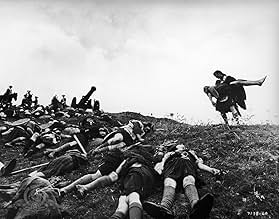IMDb RATING
6.2/10
1.6K
YOUR RATING
In eighteenth century Scotland, during the Jacobite Rebellion, David Balfour claims his inheritance from his uncle who has him shanghaied on a ship where David meets fugitive Jacobite rebel ... Read allIn eighteenth century Scotland, during the Jacobite Rebellion, David Balfour claims his inheritance from his uncle who has him shanghaied on a ship where David meets fugitive Jacobite rebel Alan Breck.In eighteenth century Scotland, during the Jacobite Rebellion, David Balfour claims his inheritance from his uncle who has him shanghaied on a ship where David meets fugitive Jacobite rebel Alan Breck.
- Director
- Writers
- Stars
- Director
- Writers
- All cast & crew
- Production, box office & more at IMDbPro
6.21.6K
1
2
3
4
5
6
7
8
9
10
Featured reviews
Very Entertaining
I enjoyed this movie very much. It is loosely based on two Robert Louis Stevenson novels, Kidnapped and its sequel Catriona. Those who would religiously stick to the contents of these novels will be disappointed in the adaptation. However, the film has, as it should IMHO, a world and plot of its own. Moreover, the plot is engaging and quite exciting.
The film movingly portrays a culture and political cause on the verge of destruction and the politics behind it. To a certain extent, it has to modify the plot of the two novels to effectively do so. Now it might have been nice if we could have heard the Scottish language spoken amongst the Highlanders. This absence makes it harder to portray the cultural conflict which was important both in the period and in the novels. However, we can forgive the film's makers by remembering that such was rarely done in the early 1970s.
The plot may not be entirely accurate in detail (the Appin murder, etc), but the portrayal of the Jacobite Rebellion is both very accurate and insightful, surprisingly so for a big-time film. The ending is a terrific and original attempt to convey the thoughts and psychology of a man through the medium of film.
All that aside, it is a historical adventure. One either likes that genre or doesn't. If the former, then the chances are you will like this.
The film movingly portrays a culture and political cause on the verge of destruction and the politics behind it. To a certain extent, it has to modify the plot of the two novels to effectively do so. Now it might have been nice if we could have heard the Scottish language spoken amongst the Highlanders. This absence makes it harder to portray the cultural conflict which was important both in the period and in the novels. However, we can forgive the film's makers by remembering that such was rarely done in the early 1970s.
The plot may not be entirely accurate in detail (the Appin murder, etc), but the portrayal of the Jacobite Rebellion is both very accurate and insightful, surprisingly so for a big-time film. The ending is a terrific and original attempt to convey the thoughts and psychology of a man through the medium of film.
All that aside, it is a historical adventure. One either likes that genre or doesn't. If the former, then the chances are you will like this.
A nice production of the classic Stevenson story.
The story begins just following the Scottish Jacobite loss to the mostly English forces at the Battle of Culloden in 1746. This battle, if you care, was the final conflict between the two nations and as a result, Scotland was forced into the new United Kingdom. To the Scots, it's among their most important event in their long history and it's not surprising that Robert Louis Stevenson placed his story following it, as he himself was Scottish.
One reviewer wrote all about how the battle was between Scottish and English (they were offended by the use of the word 'British' by some reviewers), but that isn't exactly correct. Some Scottish troops fought with the English and there would have also likely been Welsh and Irish troops fighting with them as well (nations the English had long before subjugated). As for the Jacobite Scottish, they apparently had a few English and Irish with them...very few and they were mostly Catholics who did not want Anglicanism imposed on them by the Church of England. The odds were definitely stacked against the Jacobites...and the loss seems, in hindsight, rather inevitable. Today, many in Scotland STILL mourn the loss at Culloden....but on to my actual review!!
The story begins just after this climactic battle, with a rather naive David Balfour arriving at his uncle's home in the border country to claim his inheritance. It' pretty obvious the uncle isn't a kind man and, in fact, he tries to arrange for David's 'accidental' death....though the young man manages to survive. Now you'd THINK David would throttle the elderly uncle or he'd leave the home and seek the law, but instead he foolishly stays the night. Not surprisingly, when morning arrives, the uncle has arranged for David to he 'shanghaied' aboard a sailing vessel headed for the Carolinas. But before he can be forced there, the ship stops to pick up a Scottish patriot, Alan Breck (Michael Caine)...and they plan on also robbing him and taking him to the American colonies. Fortunately, Breck and Balfour are able to prevent this and they escape from the ship and head back to Scotland. What's next? See the film...or just read the book...as the book is among Stevenson's best works (I actually like it better than his more famous "Treasure Island").
While Michael Caine seems okay in the lead, you do wonder why the story wasn't done with a Scottish actor. While most Americans, like me, probably wouldn't notice, I am pretty sure Brits noticed this casting decision.
So apart from the casting of Caine (which is NOT a serious issue for me), is the film any good? Well, considering the Stevenson source material is so good, it's hard to dislike the movie. Plus, it actually was filmed in Scotland unlike some versions of the story. I liked the lovely music as well...very moving and fitting to the story. All in all, a very good version of the story...along with some of its sequel tossed in as well.
One reviewer wrote all about how the battle was between Scottish and English (they were offended by the use of the word 'British' by some reviewers), but that isn't exactly correct. Some Scottish troops fought with the English and there would have also likely been Welsh and Irish troops fighting with them as well (nations the English had long before subjugated). As for the Jacobite Scottish, they apparently had a few English and Irish with them...very few and they were mostly Catholics who did not want Anglicanism imposed on them by the Church of England. The odds were definitely stacked against the Jacobites...and the loss seems, in hindsight, rather inevitable. Today, many in Scotland STILL mourn the loss at Culloden....but on to my actual review!!
The story begins just after this climactic battle, with a rather naive David Balfour arriving at his uncle's home in the border country to claim his inheritance. It' pretty obvious the uncle isn't a kind man and, in fact, he tries to arrange for David's 'accidental' death....though the young man manages to survive. Now you'd THINK David would throttle the elderly uncle or he'd leave the home and seek the law, but instead he foolishly stays the night. Not surprisingly, when morning arrives, the uncle has arranged for David to he 'shanghaied' aboard a sailing vessel headed for the Carolinas. But before he can be forced there, the ship stops to pick up a Scottish patriot, Alan Breck (Michael Caine)...and they plan on also robbing him and taking him to the American colonies. Fortunately, Breck and Balfour are able to prevent this and they escape from the ship and head back to Scotland. What's next? See the film...or just read the book...as the book is among Stevenson's best works (I actually like it better than his more famous "Treasure Island").
While Michael Caine seems okay in the lead, you do wonder why the story wasn't done with a Scottish actor. While most Americans, like me, probably wouldn't notice, I am pretty sure Brits noticed this casting decision.
So apart from the casting of Caine (which is NOT a serious issue for me), is the film any good? Well, considering the Stevenson source material is so good, it's hard to dislike the movie. Plus, it actually was filmed in Scotland unlike some versions of the story. I liked the lovely music as well...very moving and fitting to the story. All in all, a very good version of the story...along with some of its sequel tossed in as well.
Could Have Done With A lot More Action
The BBC broadcast an adaptation of Robert Louis Stevenson's KIDNAPPED a couple of months ago ( I really must get round to reviewing that sometime )so I found myself comparing it with this version and unfortunately this is very much inferior
The problem lies in that the movie has very little in the way of action . There's a set piece on a boat that is skimmed over far too quickly , there's a sniper attack and Alan Breck killing a couple of redcoats and that's basically it as far as action scenes go with much of the running time taken up with Breck telling everyone what a wonderful patriot he is . I guess the dialogue scenes taking precedent over sword fights and battles is caused by the producers hiring the services of some fine actors and wanting them to appear on screen as long as possible . It's fairly well acted , though I'm afraid Caine is rather miscast and he makes Alan Breck boorish and unlikable
There is one thing that puzzles me in this movie and it happens fairly often , and that is people recognise Breck as soon as they seem him even though they've not met him before but why should this be ? There was no mass media in the mid 18th Century so they'd be no TV cameras or photography and I doubt if a " Wanted " poster for Breck would capture his likeness and yet nearly every time Breck is spotted someone always gasps " It's Alan Breck ! "
Oh and can I just add something about the English / British debate that the redcoats are the Hanoverian British army while the Highlanders are Jacobites , they're Highlanders supporting the Jacobite heir Bonnie Prince Charlie and it's unlikely they considered themselves to be all that Scottish never mind British
The problem lies in that the movie has very little in the way of action . There's a set piece on a boat that is skimmed over far too quickly , there's a sniper attack and Alan Breck killing a couple of redcoats and that's basically it as far as action scenes go with much of the running time taken up with Breck telling everyone what a wonderful patriot he is . I guess the dialogue scenes taking precedent over sword fights and battles is caused by the producers hiring the services of some fine actors and wanting them to appear on screen as long as possible . It's fairly well acted , though I'm afraid Caine is rather miscast and he makes Alan Breck boorish and unlikable
There is one thing that puzzles me in this movie and it happens fairly often , and that is people recognise Breck as soon as they seem him even though they've not met him before but why should this be ? There was no mass media in the mid 18th Century so they'd be no TV cameras or photography and I doubt if a " Wanted " poster for Breck would capture his likeness and yet nearly every time Breck is spotted someone always gasps " It's Alan Breck ! "
Oh and can I just add something about the English / British debate that the redcoats are the Hanoverian British army while the Highlanders are Jacobites , they're Highlanders supporting the Jacobite heir Bonnie Prince Charlie and it's unlikely they considered themselves to be all that Scottish never mind British
Continuing Material
One gets a fuller and more rounded picture of the times that the famous Robert Louis Stevenson novel Kidnapped is set in with this version of Kidnapped. Not only is the famous Stevenson novel taken to David Balfour's return and vindication, but we go a bit farther with the story based on Stevenson's successor novel Catriona and we get the Kidnapped story firmly entrenched in the times it happened.
Those times being the days after the Battle Of Culloden where the Scottish people chose between the returning French speaking Bonnie Prince Charlie and the Hanover monarchy of George II in 1745. At Culloden the Stuart forces were destroyed and the Hanoverians firmly in control after that. Those were bad times to be a Highlander and a supporter of the Stuarts.
Lawrence Douglas plays young David Balfour and Michael Caine is Alan Breck his friend and rescuer during the kidnapping of young Balfour by Captain Jack Hawkins at the behest of Balfour's uncle Donald Pleasance.
I'll not say more as the story of Kidnapped is well known. As for the continuing material from Catriona, the differences between Alan Breck and David Balfour are brought out. Lawrence Douglas is a Hanoverian supporter and Breck a soldier in the army of Prince Charles. However Douglas is an honest young man and goes to bat for a Stuart accused of a crime he did not commit. That sets the rival Campbell clan against him and puts Advocate General Trevor Howard in a delicate position.
Howard's character is not in the first novel and he's a decent man in an impossible political position. It's Alan Breck however who sets things right in the end for all concerned.
Previous versions with Warner Baxter and Freddie Bartholomew and Peter Finch and James MacArthur only concentrated on the Kidnapped story. The Finch/MacArthur version was from Disney and marketed for kids. This film is more adult and firmly set in the politics of the time with a good ensemble cast. I'd check this out especially if I liked the work of Robert Louis Stevenson.
Those times being the days after the Battle Of Culloden where the Scottish people chose between the returning French speaking Bonnie Prince Charlie and the Hanover monarchy of George II in 1745. At Culloden the Stuart forces were destroyed and the Hanoverians firmly in control after that. Those were bad times to be a Highlander and a supporter of the Stuarts.
Lawrence Douglas plays young David Balfour and Michael Caine is Alan Breck his friend and rescuer during the kidnapping of young Balfour by Captain Jack Hawkins at the behest of Balfour's uncle Donald Pleasance.
I'll not say more as the story of Kidnapped is well known. As for the continuing material from Catriona, the differences between Alan Breck and David Balfour are brought out. Lawrence Douglas is a Hanoverian supporter and Breck a soldier in the army of Prince Charles. However Douglas is an honest young man and goes to bat for a Stuart accused of a crime he did not commit. That sets the rival Campbell clan against him and puts Advocate General Trevor Howard in a delicate position.
Howard's character is not in the first novel and he's a decent man in an impossible political position. It's Alan Breck however who sets things right in the end for all concerned.
Previous versions with Warner Baxter and Freddie Bartholomew and Peter Finch and James MacArthur only concentrated on the Kidnapped story. The Finch/MacArthur version was from Disney and marketed for kids. This film is more adult and firmly set in the politics of the time with a good ensemble cast. I'd check this out especially if I liked the work of Robert Louis Stevenson.
Kidnapped
It is actually a bit of a testament to Michael Caine's charisma, that I didn't give this one star. As a Scot, I ought to have hated it. Oddly enough, though, it's not awful. Sure, his accent is all over the place but somehow the thrust of the story is reasonably handled. It all starts with "David Balfour" (Lawrence Douglas) trekking to his uncle "Ebenezer" (Donald Pleasance) to tell him his father has passed away. The venal old gent has no intention of sharing his meagre fortune and soon "Davie" in underway across the sea under the guidance of "Capt. Hoseason" (Jack Hawkins). That ship hits a smaller one which introduces us to the Jacobite, tartan-clad, Caine ("Alan Breck Stewart") who is on the run from King George's red coats. After literally having to fight their way off the brig they have some adventures, get caught up in an high level assassination and end up with both trying to achieve their objectives against the odds. The production is pleasing to look like, and the score sets up some lovely Scottish location photography. The cast? Well, Hawkins looks like he has had way too much port; Trevor Howard is quite effective as the duplicitous Lord Advocate and the young Douglas does fine as the naive but decent young "Balfour". It is all about Michael Caine, though - and for all it's many flaws, there is no denying that the solid underpinning adventure story serves as a strong enough bedrock for this not to end up the laughable nonsense it could have been. Not a patch on the Disney version from 1959, but I didn't hate it...
Did you know
- TriviaSeveral books on Sir Michael Caine have alleged that the cast and crew were not paid because of cash problems. Caine admitted this in his 1992 autobiography "What's It All About?"
- GoofsCatriona in the getaway is wearing a blue/brown check tartan dress split up the front showing a white underskirt and a shawl. She's seen in this costume a couple of times as she, Alan Breck and David elude the redcoats but when they come across a looted cottage she's seen wearing a light brown bodice square cut across the chest and laced down the front. When they flee the cottage she's back in the tartan dress. Alan in the gateway has a belt, pistol and a long dagger. When he reaches the rear of the cottage he's also got a strap over his right shoulder to his left side with a scabard which he's lost when they leave the cottage.Alan and Catriona are given shelter by Cluny who tells his wife to give Catriona fresh clothes as her tartan dress is torn. The following morning she's seen in the tartan dress and Alan with the sword belt. The sequences have obviously been wrongly edited.
- Quotes
Alan Breck: You should not be thinking of your father now, but Scotland. Scotland, lassie, do you know what that means?
- ConnectionsFeatured in Dream Me Up Scotty! (2013)
- How long is Kidnapped?Powered by Alexa
Details
Contribute to this page
Suggest an edit or add missing content




































